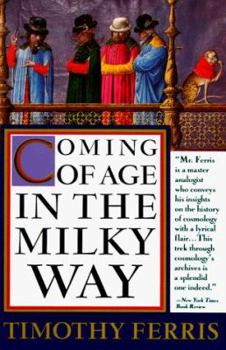Coming of Age in the Milky Way
Select Format
Select Condition 
Book Overview
Customer Reviews
Rated 5 starsCould become one of the classics
Timothy Ferris is a well-known and unusually gifted non-fiction writer dealing in astronomy. This book, The Coming of Age in the Milky Way, is the book that earned him his famous name. The problem with so many non-fiction books dealing in the so-called "hard sciences" is that the fields change so rapidly that the works very quickly become obsolete. One need look no further than Cosmos by Carl Sagan and even A Brief History...
2Report
Rated 5 starsforget Hawking
When Timothy Ferris decided to write a history of Cosmology he very nearly ended up with a book the size of the Cosmos itself. But for the final product, the result of twelve years of work, he pared three volumes of material down to a more manageable 500 pages. In so doing he has given us what must surely be one of the best books of popular science ever written.Science writing, if it is to appeal to us unwashed masses,...
0Report
Rated 5 starsQuantum Leap in a book
This is a wonderful book. A fine read, right from the start. Frankly, I am still slightly "giddy" from learning what a quantum leap really is, or at least thinking I have learned. I'm almost 50 but I think this is a wonderful book for younger readers. By younger, I mean older teens and twenty-somethings who will enjoy the entertaining approach to the universe Mr. Ferris provides. I don't currently have the book, it...
0Report
Rated 5 starsA good history of the sciences and Astronomy in particular.
This book is an excellent tour through history of astronomy and astronomers quest to uncover our place (and time) in the universe. Ferris goes into quite a bit of detail and does not treat his readers with kid gloves. There are many interesting anecdotes about various astronomers and Ferris sometimes gives mini biographies of the more interesting/eccentric of them. Ferris starts with the greek astonomers such has hypocratus,...
0Report
Rated 5 starsCOSMOS on steroids.
This book is an excellent tour through history of astronomy and astronomers quest to uncover our place (and time) in the universe. Ferris goes into quite a bit of detail and does not treat his readers with kid gloves. There are many interesting anecdotes about various astronomers and Ferris sometimes gives mini biographies of the more interesting/eccentric of them. Ferris starts with the greek astonomers such has hypocratus,...
0Report












